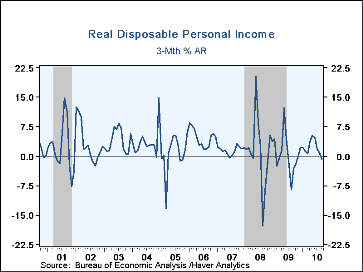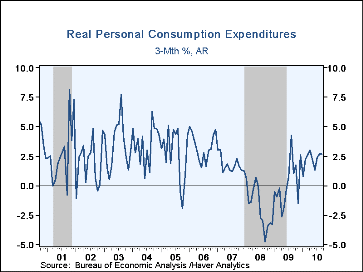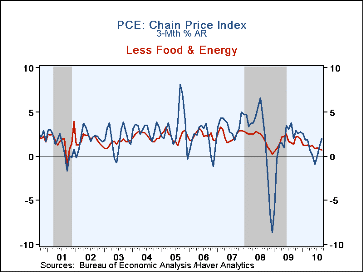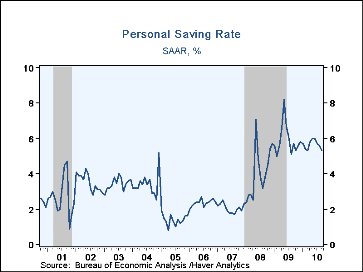 Global| Nov 01 2010
Global| Nov 01 2010U.S. Personal Income & Spending Gains Are Disappointing
by:Tom Moeller
|in:Economy in Brief
Summary
Personal income slipped an unexpected 0.1% during September following a 0.4% August increase that was downwardly revised. A 0.2% increase had been expected for last month. The troubling part of the report was the slight dip in wage & [...]
Personal income slipped an unexpected 0.1% during September following a 0.4% August increase that was downwardly revised. A 0.2% increase had been expected for last month. The troubling part of the report was the slight dip in wage & salary income. The decline followed a modest 0.2% August increase which also was downwardly revised. Despite the latest weakening, y/y growth firmed to 2.0% versus recession-related declines last year. The government sector was the weakest segment of the monthly wage figure. A 0.4% drop (+0.5% y/y) was the fourth consecutive monthly decline; factory sector wages also fell by 0.2% (+2.4% y/y).
Adding to the September income disappointment was a sharp decline in unemployment insurance benefits (-18.8% y/y). It followed the extension of jobless insurance payouts during August. Also, lower rates caused interest income to fall 0.9% (-2.6% y/y) for the third consecutive month but dividend income remained strong (+6.6% y/y). All this added up to a 0.2% decline in disposable income. Also, since taxes have risen 4.1% versus last year when they were cut to stimulate the economy, growth in take-home pay is no better. Adjusting for prices disposable income fell 0.3% (1.6% y/y) during September.
Personal consumption expenditures rose 0.2% following two months of 0.5% increase. As a result of these increases, spending growth for the quarter improved slightly to 3.6% (AR). A 0.4% September increase had been expected. Some of the monthly disappointment was due to lower gasoline prices but apparel spending also ticked up just 0.1% (4.6% y/y). Also, spending on services rose just 0.1% (3.0% y/y), held back by a monthly decline in spending on utilities. Spending on durable goods rose 0.7% (8.1% y/y) with strength in motor vehicles. Adjusted for inflation, overall spending rose just 0.1% last month and 2.3% y/y.
Since spending exceeded income, the personal savings rate fell to 5.3% from a downwardly revised 5.6% in August. The latest is the lowest since March and is down from the 5.9% for all of last year. Nevertheless, the savings rate remained up from the monthly low of 1.8% late in 2007.
Price inflation remained modest. The PCE chain price index rose just 0.1% following two months of 0.2% increase. These gains followed three months of decline during Q2. The core PCE price deflator was unchanged for the first month since April. Twelve month growth of 1.2% was its weakest since the early1960s.
The personal income & consumption figures are available in Haver's USECON and USNA databases.
Why Have The Dynamics of Labor Productivity Changed? from the Federal Reserve Bank of Kansas City it available here.
| Personal Income & Outlays (%) | September | August | July | Y/Y | 2009 | 2008 | 2007 |
|---|---|---|---|---|---|---|---|
| Personal Income | -0.1 | 0.4 | 0.2 | 3.1 | -1.7 | 4.0 | 5.7 |
| Wages & Salaries | -0.0 | 0.2 | 0.4 | 2.0 | -4.3 | 2.1 | 5.8 |
| Disposable Personal Income | -0.2 | 0.4 | 0.0 | 3.0 | 0.7 | 5.1 | 5.1 |
| Personal Consumption Expenditures | 0.2 | 0.5 | 0.5 | 3.7 | -1.0 | 3.0 | 5.2 |
| Saving Rate | 5.3 | 5.6 | 5.7 | 5.7(Sept.'09) | 5.9 | 4.1 | 2.1 |
| PCE Chain Price Index | 0.1 | 0.2 | 0.2 | 1.4 | 0.2 | 3.3 | 2.7 |
| Less Food & Energy | 0.0 | 0.1 | 0.1 | 1.2 | 1.5 | 2.3 | 2.4 |
Tom Moeller
AuthorMore in Author Profile »Prior to joining Haver Analytics in 2000, Mr. Moeller worked as the Economist at Chancellor Capital Management from 1985 to 1999. There, he developed comprehensive economic forecasts and interpreted economic data for equity and fixed income portfolio managers. Also at Chancellor, Mr. Moeller worked as an equity analyst and was responsible for researching and rating companies in the economically sensitive automobile and housing industries for investment in Chancellor’s equity portfolio. Prior to joining Chancellor, Mr. Moeller was an Economist at Citibank from 1979 to 1984. He also analyzed pricing behavior in the metals industry for the Council on Wage and Price Stability in Washington, D.C. In 1999, Mr. Moeller received the award for most accurate forecast from the Forecasters' Club of New York. From 1990 to 1992 he was President of the New York Association for Business Economists. Mr. Moeller earned an M.B.A. in Finance from Fordham University, where he graduated in 1987. He holds a Bachelor of Arts in Economics from George Washington University.
More Economy in Brief
 Global| Feb 05 2026
Global| Feb 05 2026Charts of the Week: Balanced Policy, Resilient Data and AI Narratives
by:Andrew Cates










